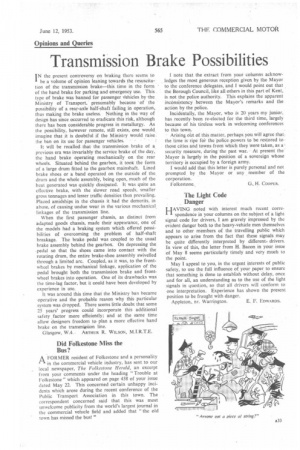Transmission Brake Possibilities
Page 67

If you've noticed an error in this article please click here to report it so we can fix it.
IN the present controversy on braking there seems to be a volume of opinion leaning towards the resuscitation of the transmission brake—this time in the form of the hand brake for parking and emergency use. This. type of brake was banned for passenger ifehicles by-the Ministry of Transport, presumably because 'of the possibility of a rear-axle half-shaft failing in operation, thus making the brake useless. Nothing in the way of design has since occurred to eradicate this risk, although there has been considerable progress in metallurgy. As the possibility, however remote, still exists, one would. imagine that it is doubtful if the Ministry would raise. the ban on its use for passenger vehicles. • It will be recalled that the transmission brake of a_ previous era was invariably the service brake of the day, the hand brake operating mechanically on the rear wheels. Situated behind the gearbox, it took the form of a large drum fitted to the gearbox mainshaft. Lined brake shoes or a band operated on the outside of the drum and the whole assembly, being open, much of the heat generated was quickly dissipated. It was quite an effective brake, with the slower road speeds, smaller gross tonnages and lesser traffic densities then prevailing. Placed amidships in the chassis it had the demerits, in abuse, of causing undue wear in the various mechanical, linkages of the transmission line.
When the first passenger chassis, as distinct from adapted goods chassis, made their appearance, one of the models had a braking system which offered possibilities of overcoming the problem of half-shaft breakage. The brake pedal was coupled to the usual brake assembly behind the gearbox. On depressing the .pedal so that the shoes came into contact with the rotating drum, the entire brake-shoe assembly swivelled through a limited arc. Coupled, as it was, to the frontwheel brakes by mechanical linkage, application of the pedal brought both the transmission brake and frontwheel brakes into operation. One of its drawbacks was the time-lag factor, but it could have been developed by experience in use. It was around this time that the Ministry ban became operative and the probable reason why this particular system was dropped. There seems little doubt that some 25 years' progress could incorporate this additional safety factor more efficiently; and at the same time allow designers freedom to plan a more effective hand brake on the transtniesion line.
Glasgow, W.4. Airrilua R. WILSON, M.I.R.T.E.
Did Folkestone Miss the Bus?
AFORMER resident of Folkestone and a personality in the commercial vehicle industry, has sent to our local newspaper, The Folkestone Herald, an excerpt from your comments under the heading "Trouble at Folkestone" which appeared on page 458 of your issue dated May 22. This concerned certain unhappy incidents which arose during the recent conference of the Public Transport Association in this town. The correspondent concerned said that this was most unwelcome publicity from the world's largest journal in the commercial vehicle field and added that "the old town has missed the bus!" note that the extract from your columns acknowledges the most generous reception given by the Mayor to the conference delegates, and I would point out that the Borough Council, like all others in this part of Kent, is not the police authority. This explains the apparent inconsistency between the Mayor's remarks and the action by the police.
Incidentally, the Mayor, who is 20 years my junior, has recently. been re-elected for the third time, largely because of his tireless work in. welcoming conferences to this town.
Arising °lit of this matter., perhaps, you. will agree that: the time is ripe fo'r the 'poliCe.powers to be restored tothose cities and towns from which they were taken, as a security measure, during the past war. At present the' Mayor is largely in the position of a sovereign whose territory is occupied by a foreign army. I would add that this letter is purely personal and not prompted by the Mayor or any . member of the corporation.
Folkestone._ G, H. COOPER.
The Light Code Danger
HWAVING noted with interest much recent correspondence in your columns on the subject of a light signal code for drivers, I am gravely impressed by the evident danger both to the heavy-vehicle men themselves and to other members of the travelling public which appears to arise from the fact that these signals may be quite differently interpreted by different. drivers. In view of this, the letter from H. Bacon in your issue of May 8 seems particularly timely and very much to the point.
May I appeal to you, in the urgent interests of public safety, to use the full influence of your paper to ensure that something is done to establish without delay, once and for all, an understanding as to the use of the light signals in question, so that all drivers will conform to one interpretation. Experience has shown the present position to be fraught with danger.
Appleton, nr. Warrington. E. F. EDWARDS.




































































































